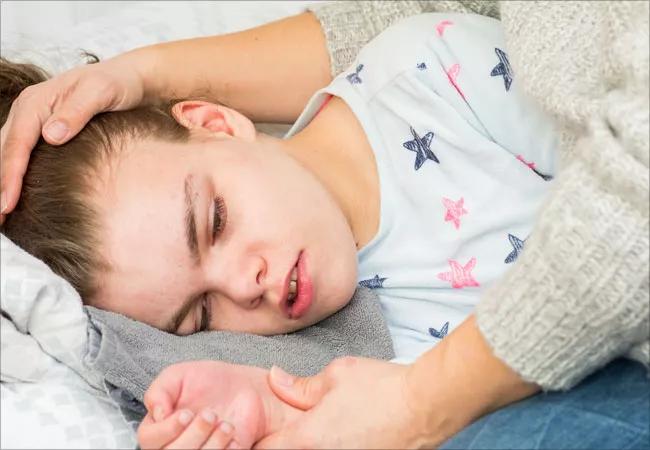
Image content: This image is available to view online.
View image online (https://assets.clevelandclinic.org/transform/c8e51b76-f2d5-4a70-8b82-5ff4650b763a/childSeizure-917730294-650x450_jpg)
Child resting on bed with head on pillow.
As parents, we know about kids with colds, runny noses and ear infections. We’ve knelt with our stomach-sick children on the bathroom floor, and we’ve felt their foreheads and wiped their tears. But if a fever were to cause a seizure, few of us are equipped to respond.
Advertisement
Cleveland Clinic is a non-profit academic medical center. Advertising on our site helps support our mission. We do not endorse non-Cleveland Clinic products or services. Policy
One in every 20 children with fever experiences a fever-related, or febrile, seizure. These children are typically between the ages of 6 months and 5 years.
A child may convulse or stiffen and lose consciousness for several minutes, then awaken and rapidly recover.
“It is traumatic to watch,” says neurologist Ajay Gupta, MD. But most of the time, febrile seizures don’t happen more than once — whether during the same illness or as a result of future fevers.
Fewer than 5% of children who experience febrile seizures will go on to experience epileptic seizures, which do recur.
The term “epilepsy” doesn’t refer to a specific disease, but to a tendency to have recurrent, unprovoked seizures over time. Possible causes of seizures in children and adolescents are:
“Most febrile or fever-related seizures are harmless,” Dr. Gupta says.
The 5% of children experiencing febrile seizures who develop epilepsy typically have one or more of the following indicators:
Advertisement
Children without these risk factors most likely will not develop epilepsy, Dr. Gupta says.
“It’s very important that you don’t panic if your child has a seizure,” says Dr. Gupta. “Instead, try to stay calm and observe the child.”
To keep your child safe and prevent accidental injury during a seizure, he advises parents to do the following:
Dr. Gupta says most fever-induced seizures last for less than three minutes. He advises that you take your child to the pediatrician so your doctor can find the fever’s source.
Your description of your child’s seizure is important for helping the pediatrician with the evaluation. The doctor will likely perform a physical examination and possibly some basic tests to ensure that nothing other than a fever has triggered the seizure.
“The child should be assessed to rule out an infection such as meningitis, as well as metabolic problems such as dehydration, low levels of glucose or sodium. Any of these underlying causes for seizure must be treated promptly,” Dr. Gupta says. “The only additional things the child needs are acetaminophen to lower the fever; hydration with water, soup or popsicles — and TLC.”
Dr. Gupta says parents should educate themselves about febrile seizures. Also, ask your pediatrician for tips on keeping your child’s fever down during an illness. This may decrease the chances of fever-related seizures.
If convulsions last five minutes or longer, take the child to the nearest medical facility for evaluation right away.
“Also, seek urgent medical attention for a child who shows symptoms of extreme lethargy, vomiting or a stiff neck,” says Dr. Gupta.
Other causes for concern include:
Advertisement
If any symptoms cause you concern, contact your pediatrician.
The following situations are emergencies, Dr. Gupta stresses. Parents should call 9-1-1 promptly if:
Children with febrile seizures should be evaluated for neurological issues if they have:
Neurological illness can cause repeated or longer-lasting febrile seizures and even seizures without fever, says Dr. Gupta. In both cases, additional testing is needed. And when doctors suspect that prolonged febrile seizures (longer than five minutes) are likely to recur, they can prescribe medication for parents to administer at home.
“Rapidly stopping the seizure may avoid an emergency room visit or hospital admission,” Dr. Gupta says.
Seizures have many causes and are fairly common in children, so don’t panic if your child has one.
It doesn’t necessarily mean they have epilepsy, nor does it mean the child has a greater risk of developing epilepsy in the future, says Dr. Gupta.
Advertisement
A seizure occurs when many brain cells abnormally fire at the same time. This temporarily disrupts the brain’s normal electrical signals. The intense, excessive electrical activity overwhelms the brain and may cause changes in behavior, awareness and body movements.
Advertisement

Sign up for our Health Essentials emails for expert guidance on nutrition, fitness, sleep, skin care and more.
Learn more about our editorial process.
Advertisement
Seizure symptoms can go far beyond convulsions and may include feelings of déjà vu, temporary confusion and unusual movements
Rest assured: Most headaches are not caused by brain tumors
What to do and what not to do
The short answer from an expert
Bleeding is a risk and warrants taking care, but the reward of this lifesaving medication is great
Type 2 diabetes isn’t inevitable with these dietary changes
Applying a hot or cold compress can help with pain
Pump up your iron intake with foods like tuna, tofu and turkey